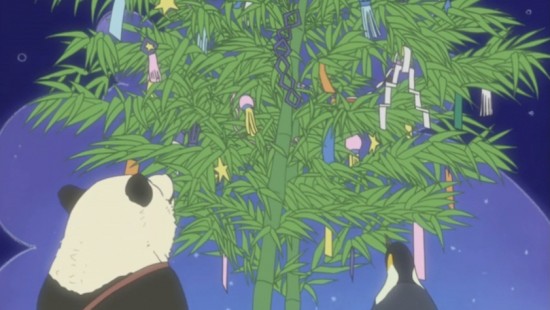
July 7 is the date of one of Japan’s most beloved festivals. It is called “Tanabata” (written as “seventh evening”). In English it is often called the “Star Festival”. It is also one of the most commonly referenced festivals in anime.

The festival is based on a rather charming myth that goes something like this:
The Tentei, who rules over the gods in Heaven, had a beautiful young daughter. She was called Orihime (“The Weaving Princess”) because she had the special ability to weave the Celestial Fabric, a cloth of unearthly beauty. She was much admired, but she was also lonely.
One day, standing on the bank of the Amanogawa or Celestial River, she saw on the other bank a comely young man herding cattle. He was called Hikoboshi (“The Cowherd Star”). She went to her father and asked to be allowed to cross the river to meet with him and he indulgently consented.
Orihime found Hikoboshi to be charming as well as handsome. He was cheerful, witty and kind, and he seemed to her far more interesting than any of the venerable sages of the Celestial Court. She went to her father and asked to be allowed to marry Hikoboshi in spite of the difference in their ranks.
The Tentei reluctantly consented, but only on condition that they both continue to diligently perform their duties.
However Orihime and Hikoboshi were so busy playing together that they neglected their duties. Orihime’s loom sat idle and Hikoboshi’s cattle were unattended.
Eventually the the gods complained to the Tentei that they were forced to wear old kimonos because there was no cloth to make new ones. Also Hikoboshi’s cows were wandering around Heaven causing all sorts of damage.
The Tentei angrily decreed that they must live separately and placed them once again on opposite banks of the Celestial River.
There they can be seen today on a Summer evening. Orihime is the second brightest star in the sky, known in the West as Vega. On the other side of the Milky Way is Hikoboshi, otherwise known as Altair the third-brightest star.
The laws of Heaven are strict but fair, and the Tentei is a stern but just ruler. However in his heart he dearly loves his wayward daughter. Eventually he was moved by her tears to relent and allow the couple to reunite for one day each year. On every other day Orihime works diligently at her loom and Hikoboshi tends his cattle, but on the seventh day of the seventh month all the magpies in the world fly up and form a bridge over the Celestial River, allowing Orihime to walk across and meet her husband.
However if it rains on Tanabata the magpies will be unable to fly and the lovers will have to wait until next year.

While there are local variations, generally Tanabata celebrations involve decorating bamboo poles or branches with streamers or other paper decorations. People write wishes on strips of colored paper and hang them on the bamboo branches hoping that Orihime and Hikoboshi will grant them.
When the festival was first imported from China during the Heian Period courtiers would write poems and hang them on the branches as offerings to the gods. Nowadays the gods must be content with wishes. Since they are hung in plain sight for everyone to see the wishes tend to be virtuous or innocuous. Traditionally boys were supposed to wish to do better in their studies and girls were supposed to wish to improve their skills at cooking and sewing. Adults commonly wish for world peace or something equally unselfish.

There are numerous references to the festival in anime, some of them quite obscure. For example the title of the undistinguished anime Hoshizora e Kakaru Hashi (Crunchyroll) is properly translated as “A Bridge Across the Starry Sky.” (Crunchyroll translates it as “A Bridge to the Starry Skies”, suggesting that the translator was unfamiliar with the Tanabata story and didn’t realize that kakaru, which has different meanings in different contexts, means “span” or “cross” when applied to bridges.)
In “Bamboo Leaf Rhapsody” (Crunchyroll) which is by far the most popular episode in the second season of “The Melancholy of Haruhi Suzumiya”, the members of the SOS Brigade celebrate Tanabata. Haruhi tells them to wish for things that can come true in 25 and 16 years since Vega and Altair are 25 and 16 light-years away and it will take that long for the wishes to reach them. She dismisses Kyon’s objection that it ought to be 50 and 32 years to allow for the round trip.
Kyon wishes for a comfortable middle-class life. Mikuru wishes to get better at cooking and sewing. Yuki wishes for “harmony” and “innovation.” Itsuki wishes for world peace and the health of his family. Haruhi wishes to “make the world revolve around me” and “I want the rotation of the Earth to go in the opposite direction.”

In a recent episode of Polar Bear Cafe (Crunchyroll) Mr. Penguin tries to tell the Tanabata story to Panda-kun. Panda-kun gets confused, mishearing “Orihime” as “Onihime” (“Devil Princess”.) Mr. Polar Bear jumps in to explain that Tanabata celebrates the love triangle between Orihime, Hikoboshi and Onihime. (And wouldn’t THAT make an interesting anime! Mark my words, in we’ll see it in a few seasons.)

In China where the festival originated it is called Qixi (“Seventh Evening”) and is celebrated on the seventh day of the seventh month of the lunar calendar, which is usually some time in August. The Chinese version of the story is somewhat different. Actually there are numerous variations of the Chinese story; I have combined elements of several versions found on the Internet to create the version below:
The Jade Emperor, who rules over the gods in Heaven, had seven daughters. The youngest was called Zhinu (The Weaver Girl) because she had the special ability to weave the ethereal fabric from which clouds and rainbows are made. She was reputed to be the prettiest of the Jade Emperor’s daughters, but also the most mischievous.
One day, without telling anyone, she sneaked out of the Celestial Palace and made her way down to Earth for she had heard many tales of that beautiful and terrible place and she longed to see it for herself. Once there she soon came upon a sparkling clear river. Being tired and dusty from her journey she hung her celestial robe on the branch of a nearby tree and began to bathe.
A cowherd named Niulang was passing by and saw her bathing. Entranced by her beauty he secretly stole the celestial robe from the tree branch and hid it. When Zhinu emerged from the water she looked around in vain for the robe. Niulang approached, offered her his cloak and pretended to help her search for it.
When the robe was not to be found Zhinu wept, for without it she could not return to Heaven. Niulang felt guilty but instead of confessing the truth he begged her to stay with him and be his wife. She finally consented since he was handsome and well-spoken, and of course he had already seen her naked.
They lived together happily for three years and had two children, a boy and a girl. However one day when Niulang was out tending his cattle Zhinu found the box where he had hidden her celestial robe. At once she thought of her parents and how anxious they must be for her. She resolved to visit them at once to set their minds at ease.
Her parents were relieved to see her though they had not been as desperate as one might think. (A goddess is not as easily harmed as a human girl and an absence of three years on Earth is equivalent to an absence of three days in Heaven.)
However her mother the Celestial Empress was furious when she learned that her daughter had married a human. She told Zhinu that she must never return to Earth and threatened to kill her children if she disobeyed.
Meanwhile Niulang searched everywhere for her to no avail. Finally his faithful old ox spoke to him saying “Niulang, your wife is being held captive in Heaven. If you stay here you will never see her again.”
Niulang was astonished. “How do you know this?” he asked. “And how is it that you can speak?”
“Know, O Niulang, that I am a god. Once I shone in Heaven as the magnificent Ox Star. But in my arrogance I flouted the just laws of the Jade Emperor and was condemned to exile on Earth. Now however the opportunity has arisen for me to be reborn in Heaven and that is why I can speak to you.
“Listen Niulang. You must slay me, tan my hide and make a pair of shoes. These will allow you to walk the path that leads to Heaven. It is a long and difficult road, but if you are strong enough it will lead you to Zhinu.”
Niulang did as he was told. Having put on the shoes he put his two children in large baskets suspended from the ends of a pole that he carried across his shoulders.
He set out along the path but he found it to be much longer and steeper than he had ever imagined. Many times he thought that he would collapse from exhaustion, but each time he remembered that if he failed he would never see Zhinu again and somehow found the strength to continue.
Finally with the last of his strength he surmounted the highest clouds and saw the vistas of Heaven stretched out before him and Zhinu running joyfully toward them.
The Celestial Empress in her anger pulled a long shining hairpin from her head and slashed it across the sky. A great river appeared full of rushing water that separated the two lovers.
There they can be seen today on a Summer evening. Zhinu is the second brightest star in the sky, known in the West as Vega. On the other side of the Milky Way is Niulang, otherwise known as Altair the third-brightest star. Next to him stand his children, the small stars Beta and Gamma Aquilae.
The Ox Star, Alpha Capricornus, watches from a short distance away.But the Jade Emperor, moved by Niulang’s courage and Zhinu’s tears, decreed that they should be able to reunite for one day each year. Thus on the seventh day of the seventh month all of the magpies in the world fly up and form a bridge over the river, allowing Zhinu to cross over and be with her family.

A version of this story is recounted in the 2010 remake of The Karate Kid.
Traditionally Qixi was primarily a day for girls to ask Zhinu to make them more skillful at things like cooking and sewing, and sometimes to compete to show off their skills.



